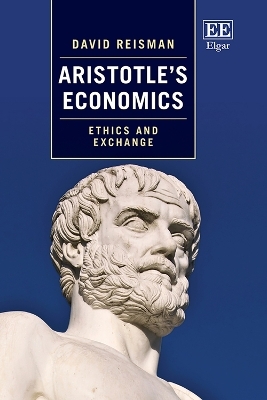
Aristotle’s Economics
Ethics and Exchange
Seiten
2024
Edward Elgar Publishing Ltd (Verlag)
978-1-0353-1543-7 (ISBN)
Edward Elgar Publishing Ltd (Verlag)
978-1-0353-1543-7 (ISBN)
Aristotle’s Economics is a thoughtful and comprehensive account of Aristotle's intellectual system. Drawing upon all of his surviving writings, this book deftly illustrates how Aristotle considered economics to be just one of many topics which made up the social and political whole.
Aristotle’s Economics is a thoughtful and comprehensive account of Aristotle's intellectual system. Drawing upon all of his surviving writings, this book deftly illustrates how Aristotle considered economics to be just one of many areas which make up the social and political whole.
David Reisman offers an in-depth and accessible analysis of Aristotle’s theories, adeptly comparing them to the work of his contemporaries. Adopting an interdisciplinary approach, this book demonstrates how Aristotle embedded his economics in a wider synthesis that extends from scientific method to ethics, law and the spectrum of constitutions. Aristotle’s economics cannot be separated from his ideas on the good society, the pragmatic state and the sensible guidance of far-sighted intellectuals. Aristotle’s Economics shows that Aristotle put morals before things. His lasting message was that material goods should only be seen as the means to a fruitful and varied life rather than as life’s end and goal.
This thought-provoking study will be of interest to students, academics and researchers in economic thought and political economy. Aristotle linked his economics to political and social theory. This book will appeal to readers who believe that the answers to many of our present-day problems lie in the history of ideas and the work of Plato’s most distinguished disciple.
Aristotle’s Economics is a thoughtful and comprehensive account of Aristotle's intellectual system. Drawing upon all of his surviving writings, this book deftly illustrates how Aristotle considered economics to be just one of many areas which make up the social and political whole.
David Reisman offers an in-depth and accessible analysis of Aristotle’s theories, adeptly comparing them to the work of his contemporaries. Adopting an interdisciplinary approach, this book demonstrates how Aristotle embedded his economics in a wider synthesis that extends from scientific method to ethics, law and the spectrum of constitutions. Aristotle’s economics cannot be separated from his ideas on the good society, the pragmatic state and the sensible guidance of far-sighted intellectuals. Aristotle’s Economics shows that Aristotle put morals before things. His lasting message was that material goods should only be seen as the means to a fruitful and varied life rather than as life’s end and goal.
This thought-provoking study will be of interest to students, academics and researchers in economic thought and political economy. Aristotle linked his economics to political and social theory. This book will appeal to readers who believe that the answers to many of our present-day problems lie in the history of ideas and the work of Plato’s most distinguished disciple.
David Reisman, Professor Emeritus of Economics, University of Surrey, UK and Senior Associate, Centre for Liberal Arts and Social Sciences, Nanyang Technological University, Singapore
Contents:
1 Introduction
2 A code of conduct
3 A science of society
4 Property
5 Exchange
6 Exchange gone wrong
7 Consumption
8 Nature in motion
9 The state
10 Intervention and reform
11 The constitution
12 Aristotle today
References
Index
| Erscheinungsdatum | 18.01.2024 |
|---|---|
| Verlagsort | Cheltenham |
| Sprache | englisch |
| Maße | 156 x 234 mm |
| Themenwelt | Geschichte ► Teilgebiete der Geschichte ► Wirtschaftsgeschichte |
| Wirtschaft ► Allgemeines / Lexika | |
| Wirtschaft ► Volkswirtschaftslehre ► Wirtschaftspolitik | |
| ISBN-10 | 1-0353-1543-2 / 1035315432 |
| ISBN-13 | 978-1-0353-1543-7 / 9781035315437 |
| Zustand | Neuware |
| Informationen gemäß Produktsicherheitsverordnung (GPSR) | |
| Haben Sie eine Frage zum Produkt? |
Mehr entdecken
aus dem Bereich
aus dem Bereich
Macht und Herrschaft im Zarenreich
Buch | Hardcover (2024)
C.H.Beck (Verlag)
CHF 69,85
wie die USA und China um die technologische Vorherrschaft auf der …
Buch | Hardcover (2023)
Rowohlt (Verlag)
CHF 41,95


